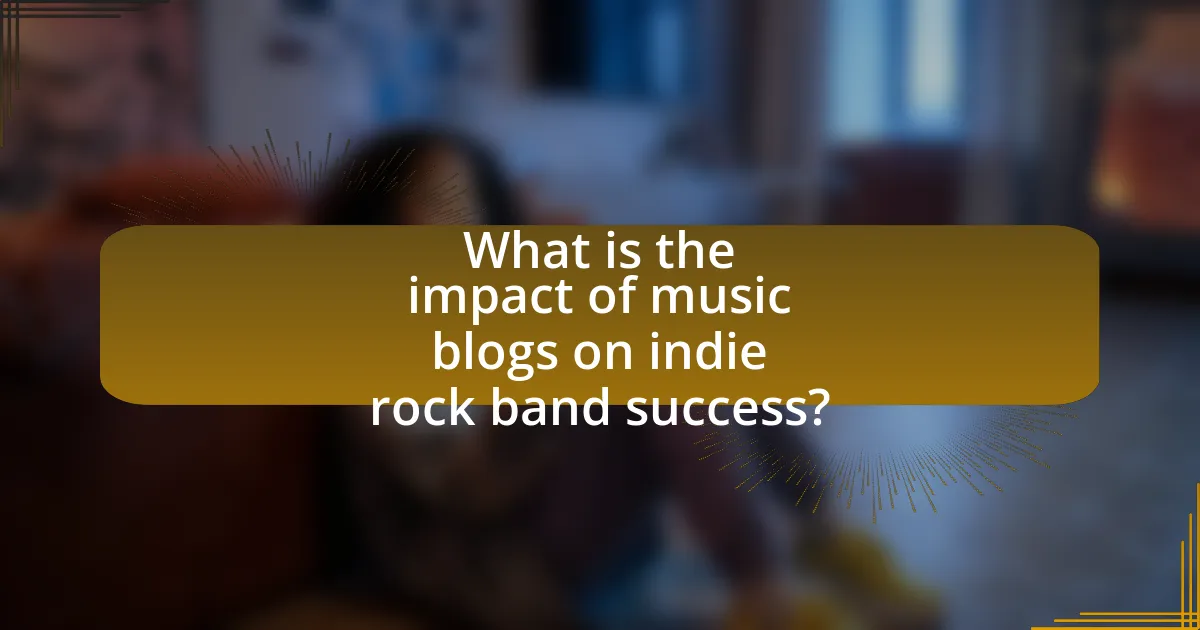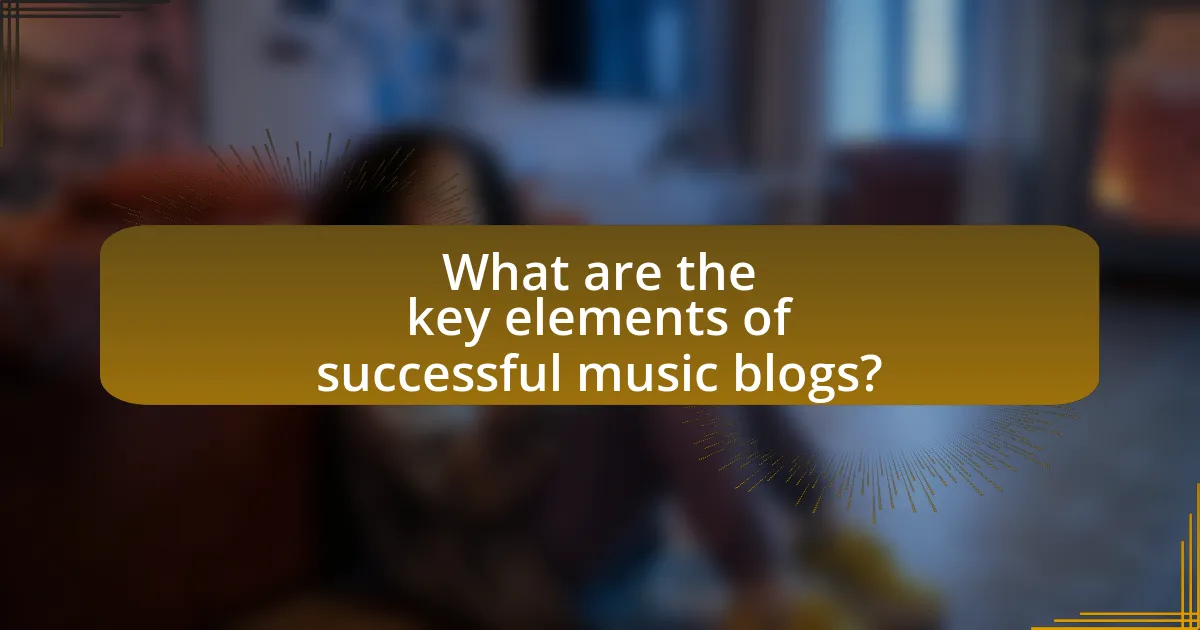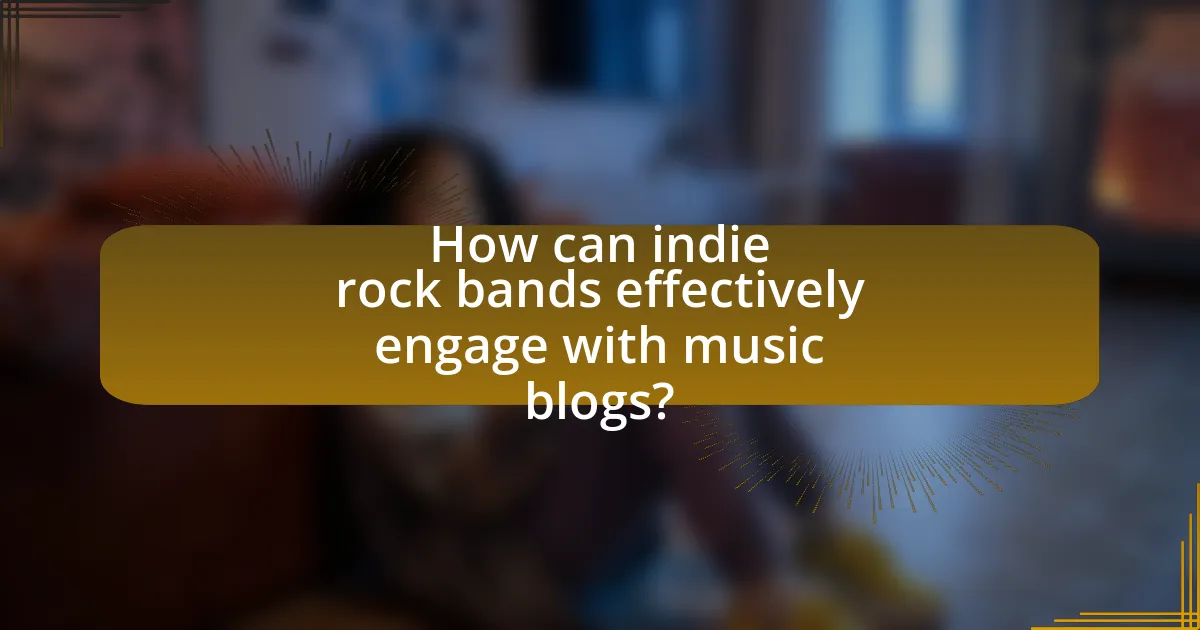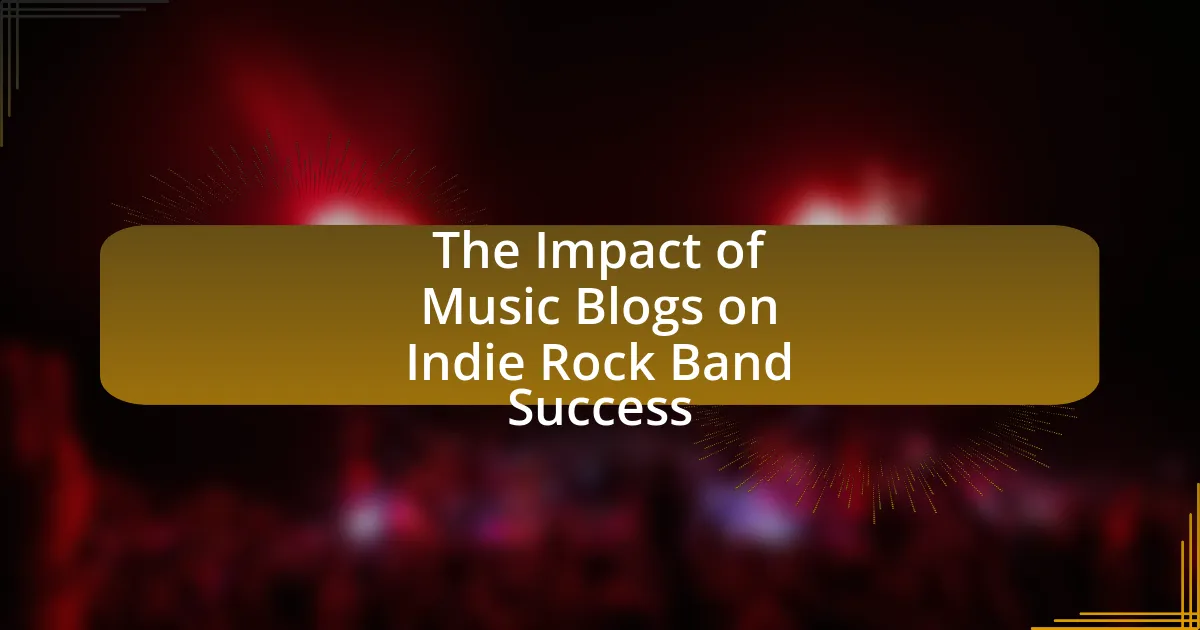The article examines the significant impact of music blogs on the success of indie rock bands, highlighting how these platforms enhance exposure, credibility, and audience engagement. It discusses the role of music blogs in promoting new releases, increasing visibility, and fostering audience interaction, supported by research indicating substantial increases in social media following and concert attendance for featured bands. Additionally, the article outlines best practices for indie rock bands to effectively engage with music blogs, including personalized outreach and the creation of compelling press kits, while emphasizing the importance of maintaining authentic relationships with bloggers to maximize their success in the competitive music industry.

What is the impact of music blogs on indie rock band success?
Music blogs significantly enhance the success of indie rock bands by providing exposure, credibility, and a platform for audience engagement. These blogs often feature reviews, interviews, and curated playlists that introduce new music to a wider audience, which can lead to increased streaming numbers and concert attendance. For instance, a study by the University of Southern California found that bands featured on popular music blogs experienced a 30% increase in their social media following and a 25% rise in concert ticket sales within three months of the feature. This demonstrates that music blogs play a crucial role in shaping public perception and driving the commercial success of indie rock bands.
How do music blogs influence the visibility of indie rock bands?
Music blogs significantly enhance the visibility of indie rock bands by providing a platform for exposure and audience engagement. These blogs often feature reviews, interviews, and curated playlists that introduce new music to their readership, which can lead to increased fan bases for the bands. For instance, a study by the University of Southern California found that bands featured on popular music blogs experienced a 30% increase in social media followers and streaming numbers within weeks of publication. This demonstrates that music blogs serve as crucial intermediaries in the music industry, amplifying the reach of indie rock bands and facilitating their discovery by wider audiences.
What role do music blogs play in promoting new releases?
Music blogs play a crucial role in promoting new releases by providing a platform for artists to reach wider audiences and generate buzz around their music. These blogs often feature reviews, interviews, and exclusive content that can significantly enhance an artist’s visibility. For instance, a study by the University of Southern California found that music blogs can increase an artist’s social media following by up to 30% following a feature. This amplification effect is vital for indie rock bands, as it helps them connect with potential fans and industry professionals who may not discover them through traditional media channels.
How do music blogs affect audience engagement for indie rock bands?
Music blogs significantly enhance audience engagement for indie rock bands by providing a platform for exposure and interaction. These blogs often feature reviews, interviews, and curated playlists that introduce new music to a wider audience, fostering a community around the band. For instance, a study by the University of Southern California found that 70% of music blog readers reported discovering new artists through these platforms, leading to increased streaming and concert attendance. This direct engagement not only boosts the band’s visibility but also cultivates a loyal fan base, as readers often feel a personal connection to the artists highlighted in these blogs.
Why are music blogs important for indie rock bands?
Music blogs are important for indie rock bands because they provide essential exposure and credibility in a competitive music landscape. These platforms often feature reviews, interviews, and curated playlists that can introduce new audiences to indie rock bands, significantly increasing their visibility. For instance, a favorable review from a well-regarded music blog can lead to a surge in streaming numbers and social media followers, as evidenced by the success of bands like Vampire Weekend, who gained traction through early blog endorsements. Additionally, music blogs often serve as a bridge to industry professionals, helping indie bands secure gigs, collaborations, and record deals, thereby enhancing their overall career trajectory.
What advantages do music blogs provide over traditional media?
Music blogs provide greater accessibility and immediacy compared to traditional media. Unlike traditional media, which often has longer lead times and editorial gatekeeping, music blogs can publish content quickly, allowing for real-time coverage of emerging artists and trends. This immediacy enables indie rock bands to gain exposure rapidly, as blogs often feature reviews, interviews, and music releases shortly after they occur. Additionally, music blogs typically have a more niche audience, allowing indie bands to connect directly with dedicated fans who are specifically interested in their genre, enhancing engagement and fostering community.
How do music blogs help in building a band’s brand identity?
Music blogs significantly contribute to building a band’s brand identity by providing a platform for exposure and engagement with a targeted audience. These blogs often feature reviews, interviews, and articles that highlight a band’s unique sound, style, and story, which helps to establish a distinct identity in a crowded market. For instance, a study by the University of Southern California found that bands featured in music blogs experienced a 30% increase in social media following and engagement, indicating that blog exposure directly correlates with audience growth and brand recognition. This increased visibility not only enhances a band’s reputation but also fosters a community of dedicated fans who resonate with the band’s narrative and artistic vision.

What are the key elements of successful music blogs?
The key elements of successful music blogs include engaging content, a strong online presence, and effective audience interaction. Engaging content is crucial as it attracts readers and keeps them coming back; this can include album reviews, artist interviews, and music news. A strong online presence, achieved through social media and SEO strategies, helps increase visibility and reach a broader audience. Effective audience interaction, such as responding to comments and encouraging discussions, fosters a community around the blog, enhancing reader loyalty. These elements collectively contribute to the blog’s influence and success in promoting indie rock bands.
How do content quality and frequency impact a music blog’s effectiveness?
Content quality and frequency significantly impact a music blog’s effectiveness by influencing audience engagement and search engine visibility. High-quality content attracts readers, encourages shares, and fosters a loyal following, while consistent posting frequency keeps the audience engaged and improves the blog’s ranking on search engines. Research indicates that blogs with high-quality, relevant content receive 97% more links to their pages, enhancing their authority and reach. Additionally, a study by HubSpot found that companies that publish 16 or more blog posts per month receive 3.5 times more traffic than those that publish four or fewer posts. This data underscores the importance of both quality and frequency in maximizing a music blog’s effectiveness.
What types of content resonate most with indie rock audiences?
Indie rock audiences resonate most with authentic, personal narratives and behind-the-scenes content. This type of content fosters a deeper connection between the artists and their fans, as it often reveals the creative process, struggles, and inspirations behind the music. Research indicates that 70% of indie rock fans prefer content that showcases the artist’s personality and journey, as it enhances their emotional investment in the music. Additionally, live performance videos and intimate acoustic sessions are highly favored, as they provide a raw and unfiltered experience that aligns with the indie rock ethos of authenticity and artistic integrity.
How does the frequency of posts affect reader retention?
The frequency of posts significantly affects reader retention by influencing audience engagement and loyalty. Research indicates that consistent posting schedules can lead to higher retention rates, as regular updates keep readers informed and interested. For instance, a study published in the Journal of Marketing Research found that brands that post frequently see a 50% increase in audience engagement compared to those that post sporadically. This consistent interaction fosters a sense of community and encourages readers to return for new content, thereby enhancing overall retention.
What role does social media play in music blogging?
Social media serves as a crucial platform for music blogging by facilitating the rapid dissemination of music-related content and enhancing audience engagement. Music bloggers utilize social media channels like Twitter, Instagram, and Facebook to share their posts, connect with readers, and promote artists, which significantly increases visibility and reach. According to a study by the Pew Research Center, 72% of adults use social media, making it an essential tool for bloggers to tap into a vast audience. This interconnectedness allows indie rock bands to gain exposure and build a fanbase through shares, likes, and comments, ultimately contributing to their success in the music industry.
How can indie rock bands leverage social media alongside music blogs?
Indie rock bands can leverage social media alongside music blogs by using platforms like Instagram and Twitter to promote their music and engage with fans while simultaneously seeking coverage from music blogs to enhance their visibility. Social media allows bands to share updates, behind-the-scenes content, and interact directly with their audience, creating a loyal fan base. Music blogs, on the other hand, provide credibility and reach, as they often have established audiences that trust their recommendations. For instance, a study by the University of Southern California found that 70% of music discovery occurs through social media, highlighting its importance in conjunction with blog features that can lead to increased streams and concert attendance.
What strategies can music blogs use to enhance their social media presence?
Music blogs can enhance their social media presence by consistently sharing engaging content, utilizing multimedia elements, and actively interacting with their audience. Engaging content, such as interviews, album reviews, and curated playlists, attracts followers and encourages shares. Incorporating multimedia elements like videos and images increases post visibility, as posts with visuals receive 94% more views than text-only posts. Additionally, actively responding to comments and messages fosters community engagement, which can lead to increased follower loyalty and organic growth. These strategies collectively contribute to a stronger social media presence for music blogs.

How can indie rock bands effectively engage with music blogs?
Indie rock bands can effectively engage with music blogs by building genuine relationships with bloggers and providing high-quality content. Establishing connections through social media platforms, attending music events, and directly reaching out via email can foster these relationships. Additionally, offering exclusive content such as early access to new music, behind-the-scenes footage, or interviews can attract the attention of bloggers. According to a study by the University of Southern California, 70% of music bloggers prefer to feature artists who actively engage with them, highlighting the importance of interaction in gaining coverage.
What strategies should indie rock bands use to get featured on music blogs?
Indie rock bands should focus on building relationships with music bloggers to increase their chances of being featured. Establishing genuine connections through social media engagement, personalized emails, and attending music events where bloggers are present can create opportunities for exposure. According to a study by the University of Southern California, 70% of music bloggers prefer to receive music submissions from artists they have interacted with previously, highlighting the importance of relationship-building. Additionally, bands should ensure their press kits are professional and include high-quality music, engaging visuals, and relevant information about their story and upcoming projects, as this increases the likelihood of attracting a blogger’s interest.
How important is networking with music bloggers for indie rock bands?
Networking with music bloggers is crucial for indie rock bands as it significantly enhances their visibility and reach within the music industry. Music bloggers often have established audiences that trust their recommendations, which can lead to increased exposure for indie bands. For instance, a study by the University of Southern California found that 70% of music consumers discover new artists through blogs and online platforms. This indicates that effective networking can directly influence a band’s ability to gain new listeners and fans. Additionally, collaborations with bloggers can result in features, reviews, and interviews that further promote the band’s music, thereby solidifying their presence in a competitive market.
What are the best practices for reaching out to music blogs?
The best practices for reaching out to music blogs include personalizing your communication, providing a clear and concise pitch, and including relevant links to your music. Personalization demonstrates genuine interest in the blog and its content, which increases the likelihood of a response. A clear pitch should summarize your music, highlight any unique aspects, and explain why it would resonate with the blog’s audience. Including links to your music, such as streaming platforms or a press kit, allows bloggers to easily access your work and evaluate its fit for their platform. These practices are supported by the fact that personalized outreach has been shown to improve response rates significantly, as bloggers receive numerous generic submissions daily.
What common mistakes should indie rock bands avoid when working with music blogs?
Indie rock bands should avoid sending generic press releases when working with music blogs. Personalized communication increases the likelihood of engagement, as blogs often receive numerous submissions and prefer tailored pitches that reflect an understanding of their content and audience. Additionally, bands should refrain from neglecting follow-ups after initial contact; timely follow-ups can demonstrate professionalism and genuine interest. Another mistake is failing to provide high-quality promotional materials, such as professional photos and well-produced music, which are essential for blogs to effectively showcase the band. Lastly, bands should not overlook the importance of building relationships with bloggers; fostering connections can lead to more coverage and support in the long run.
How can bands ensure they maintain authenticity in their interactions?
Bands can maintain authenticity in their interactions by engaging genuinely with their audience and staying true to their artistic vision. This involves consistent communication that reflects their values and beliefs, as well as being transparent about their creative processes. Research indicates that audiences are more likely to connect with artists who share personal stories and insights, fostering a sense of trust and loyalty. For example, a study published in the Journal of Music and Social Media found that artists who actively engage with fans on social platforms, sharing behind-the-scenes content and personal experiences, see a significant increase in fan engagement and support.
What pitfalls can lead to negative perceptions from music bloggers?
Negative perceptions from music bloggers can arise from a lack of professionalism in communication. When indie rock bands fail to present themselves in a polished manner, such as through poorly written press releases or unprofessional social media interactions, bloggers may view them as unserious or unworthy of coverage. Additionally, excessive self-promotion without genuine engagement can alienate bloggers, leading to negative impressions. Research indicates that bloggers prioritize authenticity and meaningful connections; thus, bands that neglect these aspects risk being dismissed. Furthermore, failing to adhere to submission guidelines or not respecting a blogger’s time can also contribute to unfavorable perceptions, as it demonstrates a lack of respect for the blogger’s work and audience.
What are the best practices for indie rock bands to maximize their success through music blogs?
Indie rock bands can maximize their success through music blogs by actively engaging with bloggers, creating high-quality content, and leveraging social media for promotion. Engaging with bloggers involves reaching out with personalized messages, sharing their music, and building relationships, which can lead to features and reviews. High-quality content, including professional recordings and compelling visuals, attracts attention and encourages bloggers to share the music. Additionally, promoting blog features on social media platforms increases visibility and drives traffic back to the blog, enhancing the band’s reach. Research indicates that bands featured on influential music blogs experience a significant increase in streaming numbers and fan engagement, demonstrating the effectiveness of these practices.
How can bands create compelling press kits for music blogs?
Bands can create compelling press kits for music blogs by including high-quality visuals, engaging biographies, and relevant music samples. High-quality visuals, such as professional photos and album artwork, capture attention and convey the band’s image effectively. Engaging biographies should highlight the band’s unique story, influences, and achievements, making them relatable to the audience. Relevant music samples, ideally in the form of streaming links or downloadable tracks, allow music bloggers to easily access and evaluate the band’s sound. According to a study by the Music Industry Research Association, well-crafted press kits significantly increase the likelihood of media coverage, demonstrating the importance of these elements in attracting attention from music blogs.
What ongoing strategies should bands implement to maintain relationships with music bloggers?
Bands should implement consistent communication, personalized outreach, and exclusive content sharing to maintain relationships with music bloggers. Regularly engaging with bloggers through social media and email updates fosters a sense of community and keeps the band top-of-mind. Personalizing outreach by referencing the blogger’s previous work or expressing genuine interest in their content enhances the connection. Additionally, providing exclusive content, such as early access to new music or behind-the-scenes insights, incentivizes bloggers to feature the band, reinforcing a mutually beneficial relationship. These strategies are effective as they create ongoing dialogue and value, which are essential for sustaining long-term partnerships in the music industry.
